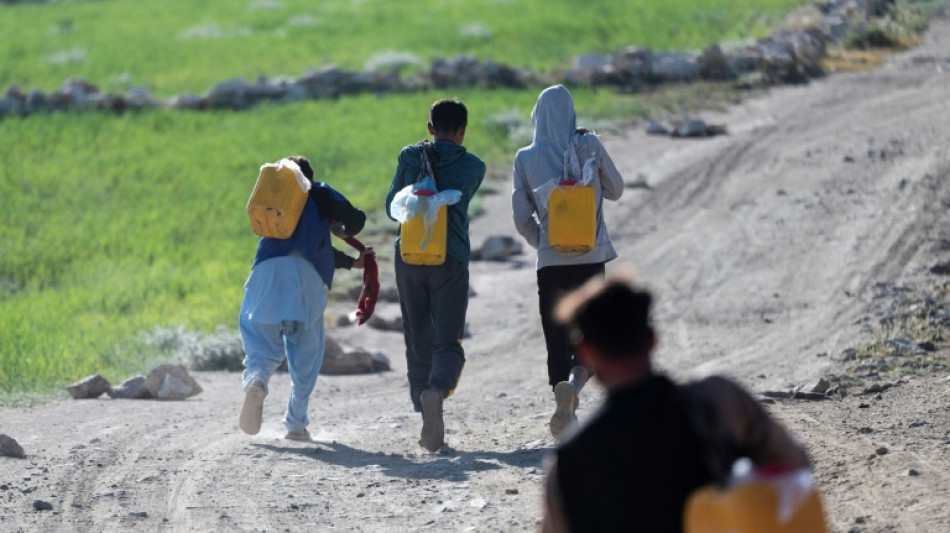
-
 LA mayor urges US to reassure visiting World Cup fans
LA mayor urges US to reassure visiting World Cup fans
-
Madrid condemned to Champions League play-off after Benfica loss

-
 Meta shares jump on strong earnings report
Meta shares jump on strong earnings report
-
Haaland ends barren run as Man City reach Champions League last 16

-
 PSG and Newcastle drop into Champions League play-offs after stalemate
PSG and Newcastle drop into Champions League play-offs after stalemate
-
Salah ends drought as Liverpool hit Qarabag for six to reach Champions League last 16

-
 Barca rout Copenhagen to reach Champions League last 16
Barca rout Copenhagen to reach Champions League last 16
-
Arsenal complete Champions League clean sweep for top spot

-
 Kolo Muani and Solanke send Spurs into Champions League last 16
Kolo Muani and Solanke send Spurs into Champions League last 16
-
Bayern inflict Kane-ful Champions League defeat on PSV

-
 Pedro double fires Chelsea into Champions League last 16, dumps out Napoli
Pedro double fires Chelsea into Champions League last 16, dumps out Napoli
-
US stocks move sideways, shruggging off low-key Fed meeting

-
 US capital Washington under fire after massive sewage leak
US capital Washington under fire after massive sewage leak
-
Anti-immigration protesters force climbdown in Sundance documentary

-
 US ambassador says no ICE patrols at Winter Olympics
US ambassador says no ICE patrols at Winter Olympics
-
Norway's Kristoffersen wins Schladming slalom

-
 Springsteen releases fiery ode to Minneapolis shooting victims
Springsteen releases fiery ode to Minneapolis shooting victims
-
Brady latest to blast Belichick Hall of Fame snub

-
 Trump battles Minneapolis shooting fallout as agents put on leave
Trump battles Minneapolis shooting fallout as agents put on leave
-
SpaceX eyes IPO timed to planet alignment and Musk birthday: report

-
 White House, Slovakia deny report on Trump's mental state
White House, Slovakia deny report on Trump's mental state
-
Iran vows to resist any US attack, insists ready for nuclear deal

-
 Colombia leader offers talks to end trade war with Ecuador
Colombia leader offers talks to end trade war with Ecuador
-
Former Masters champ Reed returning to PGA Tour from LIV

-
 US Fed holds interest rates steady, defying Trump pressure
US Fed holds interest rates steady, defying Trump pressure
-
Norway's McGrath tops first leg of Schladming slalom

-
 Iraq PM candidate Maliki denounces Trump's 'blatant' interference
Iraq PM candidate Maliki denounces Trump's 'blatant' interference
-
Neil Young gifts music to Greenland residents for stress relief

-
 Rubio upbeat on Venezuela cooperation but wields stick
Rubio upbeat on Venezuela cooperation but wields stick
-
'No. 1 fan': Rapper Minaj backs Trump

-
 Fear in Sicilian town as vast landslide risks widening
Fear in Sicilian town as vast landslide risks widening
-
'Forced disappearance' probe opened against Colombian cycling star Herrera

-
 Seifert, Santner give New Zealand consolation T20 win over India
Seifert, Santner give New Zealand consolation T20 win over India
-
King Charles III warns world 'going backwards' in climate fight

-
 Minneapolis activists track Trump's immigration enforcers
Minneapolis activists track Trump's immigration enforcers
-
Court orders Dutch to protect Caribbean island from climate change

-
 Sterling agrees Chelsea exit after troubled spell
Sterling agrees Chelsea exit after troubled spell
-
Rules-based trade with US is 'over': Canada central bank head

-
 Lucas Paqueta signs for Flamengo in record South American deal
Lucas Paqueta signs for Flamengo in record South American deal
-
Holocaust survivor urges German MPs to tackle resurgent antisemitism

-
 'Extraordinary' trove of ancient species found in China quarry
'Extraordinary' trove of ancient species found in China quarry
-
Villa's Tielemans ruled out for up to 10 weeks

-
 Google unveils AI tool probing mysteries of human genome
Google unveils AI tool probing mysteries of human genome
-
UK proposes to let websites refuse Google AI search

-
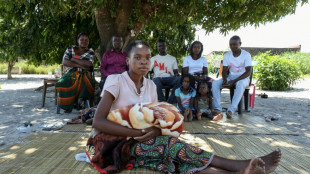 'I wanted to die': survivors recount Mozambique flood terror
'I wanted to die': survivors recount Mozambique flood terror
-
Trump issues fierce warning to Minneapolis mayor over immigration
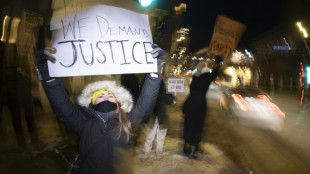
-
 Anglican church's first female leader confirmed at London service
Anglican church's first female leader confirmed at London service
-
Germany cuts growth forecast as recovery slower than hoped
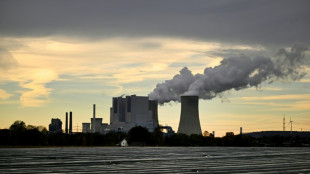
-
 Amazon to cut 16,000 jobs worldwide
Amazon to cut 16,000 jobs worldwide
-
One dead, five injured in clashes between Colombia football fans
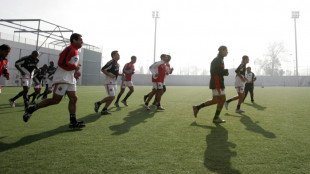

'Serious problem': Afghan capital losing race against water shortages
Every week, Bibi Jan scrapes together some of her husband's meagre daily wage to buy precious water from rickshaw-drawn tankers that supply residents of Afghanistan's increasingly parched capital.
Kabul faces a looming water crisis, driven by unruly and rapid urbanisation, mismanagement over years of conflict, and climate change, meaning people like Bibi Jan are sometimes forced to choose between food and water.
"When my children have only tea for a few days, they say, 'You bought water and nothing for us'," the 45-year-old housewife told AFP, describing reusing her supplies for bathing, dishes and laundry.
Experts have long sounded the alarm over Kabul's water problems, which are worsening even as many international players have backed off big infrastructure projects and slashed funding to Afghanistan since the Taliban government took power in 2021.
"There could be no ground water in Kabul by 2030" without urgent action, the UN children's agency UNICEF warned last year.
Other experts are more cautious, citing limited consistent and reliable data, but say the situation is clearly deteriorating.
A 2030 cliff is a "worst-case scenario", said water resources management expert Assem Mayar.
But even if slated development projects are completed in a few years, it "doesn't mean the situation would become better than now", Mayar said.
"As time goes on, the problems are only increasing," he added, as population growth outstrips urban planning and climate change drives below-average precipitation.
- 'Decreasing day by day' -
The Taliban authorities have launched projects ranging from recycling water to building hundreds of small dams across the country, but larger interventions remain hampered by financing and technical capacity.
They remain unrecognised by any country since they ousted the Western-backed government and imposed their severe interpretation of Islamic law, with restrictions on women a major sticking point.
They have repeatedly called for non-governmental groups to reboot stalled projects on water and climate change, as Afghanistan faces "some of the harshest effects" in the region, according to the United Nations.
The water and energy ministry wants to divert water from the Panjshir river to the capital, but needs $300 million to $400 million. A dam project near Kabul would ease pressures but was delayed after the Taliban takeover.
For now, Kabul's primary drinking water source is groundwater, as much as 80 percent of which is contaminated, according to a May report by Mercy Corps.
It is tapped by more than 100,000 unregulated wells across the city that are regularly deepened or run dry, the NGO said.
Groundwater can be recharged, but more is drawn each year than is replenished in Kabul, with an estimated annual 76-million-cubic-metre (20-billion-gallon) deficit, experts say.
"It's a very serious problem... Water is decreasing day by day in the city," said Shafiullah Zahidi, who heads central Kabul operations for the state-owned water company UWASS.
Water systems designed decades ago serve just 20 percent of the city's population, which has exploded to around six million over the past 20 years, said Zahidi.
- 'Use less water' -
At one of Kabul's 15 pumping stations, maintenance manager Mohammad Ehsan said the seven-year-old well is already producing less water. Two others nearby sit dry.
"The places with shallower water levels are dried out now," said 53-year-old Ehsan, who has worked in water management for two decades, as he stood over an old well.
It once produced water from a depth of 70 metres (230 feet), but a newer well had to be bored more than twice as deep to reach groundwater.
At one of the two large stations in the city, the International Committee of the Red Cross (ICRC) recently procured four new pumps where only one had been functioning.
"If that pump collapsed for any reason, that means stopping the service for 25,000 beneficiary households," which now have uninterrupted water, said Baraa Afeh, ICRC's deputy water and habitat coordinator.
Everyone in Kabul "should have 24-hour service", said Zahidi, from the state water company.
But in reality, Bibi Jan and many other Kabulis are forced to lug water in heavy jugs from wells or buy it from tankers.
These suppliers charge at least twice as much as the state-owned utility, with potable water even more pricy in a country where 85 percent of the population lives on less than a dollar a day.
Bibi Jan said she has to police her family's water use carefully.
"I tell them, 'I'm not a miser but use less water.' Because if the water runs out then what would we do?"
S.Gantenbein--VB



